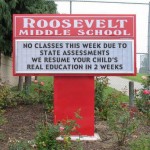How should schools provide individual learning opportunities and motivation to accelerate learning while following standardized curricula goals aligned with the Common Core? One on one mentoring might be an answer. Whether schools can put together teams of five or a hundred mentors, giving students a half hour of undivided attention makes all the difference in the world. And it is free.
Who can mentor? Those that choose to mentor need to understand two things: commitment and confidentiality. Matching mentors and mentees requires dedicated organization and planning time. Knowing the capabilities of the mentors helps structure the goals of the program.
Some programs match older and younger students, some rely on professionals in a field specific to a student’s interest. Despite the pairing models it is a fact that numerous interactions with people who value literacy transcends age, gender and socioeconomic levels. Our program matched 115 mentors/ schedules with schedules of 98 students, 4 days a week. This was a program that was years in the making.
How does it work? The planner organizes the lessons to match the student’s individual progress. That person relies on delivering simple, short, instructions for repetitive weekly routine lessons. Skill level will change throughout the course of the lessons while routines continue. Mentors and mentees both gain self -reliance while planners gain time to provide for activities matching individual progress Therefore, no time is wasted which means, that students don’t have time to text.
Mentoring is a Response to Intervention (RTI). Students are diagnosed not by failure but by the parameters of possible achievement. Gifted and Talented as well as reluctant, resistant or remedial students can drop their labels. When focus shifts to skills and strategies as modeled by mentors, gains in self -reliance are an immediate result. Students become their own agents of change, just ask Temple Grandin, a huge proponent of mentoring.
When using this method with reading, instruction is complex. When and how students make text connections is an individual process, but the opportunity for success increases when reading results from social interaction and verbal communication. Reading aloud, listening, predicting, investigating, inferring happen when conversations are deliberate. Lifelong relationships with a mentor is a bonus and these relationships are priceless.
Images via Kidactivities.net
References
Grandin T. Autism from the Inside. Educational Leadership [fusion_builder_container hundred_percent=”yes” overflow=”visible”][fusion_builder_row][fusion_builder_column type=”1_1″ background_position=”left top” background_color=”” border_size=”” border_color=”” border_style=”solid” spacing=”yes” background_image=”” background_repeat=”no-repeat” padding=”” margin_top=”0px” margin_bottom=”0px” class=”” id=”” animation_type=”” animation_speed=”0.3″ animation_direction=”left” hide_on_mobile=”no” center_content=”no” min_height=”none”][serial online]. February 2007;64(5):29-32. Available from: Education Research Complete, Ipswich, MA. Accessed January 7, 2013.
Little, C. A., Kearney, K. L., & Britner, P. A. (2010). Students’ Self-Concept and Perceptions of Mentoring Relationships in a Summer Mentorship Program for Talented Adolescents. Roeper Review, 32(3), 189-199. doi:10.1080/02783193.2010.485307
Paterson, P. O., & Elliott, L. N. (2006). Struggling reader to struggling reader: High school students’ responses to a cross-age tutoring program. Journal Of Adolescent & Adult Literacy, 49(5), 378-389. doi:10.1598/JAAL.49.5.2[/fusion_builder_column][/fusion_builder_row][/fusion_builder_container]




